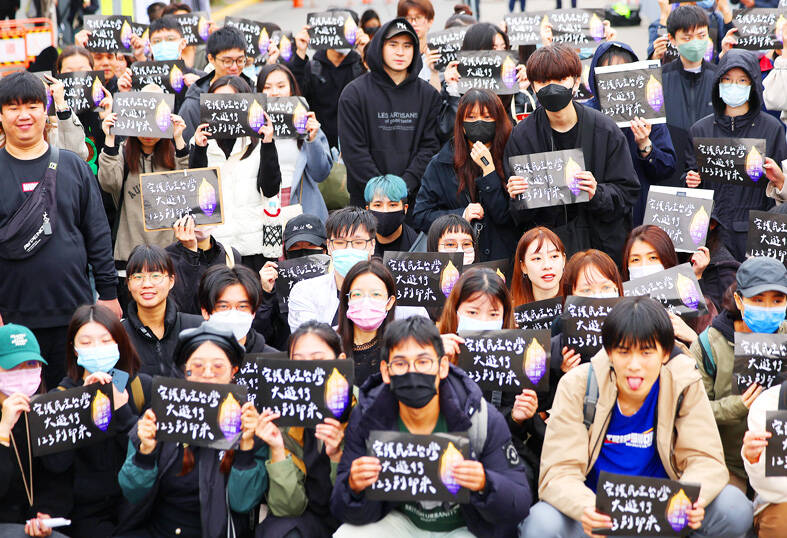A small-scale protest that called on the government to cancel its plan to welcome Indian migrant workers in a bid to tackle Taiwan’s labor shortage was held in Taipei yesterday.
During the protest, comprised of a few dozen people staged in front of the Presidential Office on Ketagalan Boulevard, the protest’s chief initiator, a woman identified only as “Yuna” said they wanted the central government to reconsider allowing migrant workers from India to enter Taiwan.
Most people in Taiwan had little knowledge about the potential plan to allow in Indian migrant workers until a report in the media last month, she said.

Photo: CNA
She also said the government failed to explain why migrant workers from “yet another source country” needed to be introduced, adding that the government had not provided a comprehensive evaluation report on how it had concluded that this move was essential.
She alleged, without evidence, that more migrant workers in Taiwan would lead to stagnant wages.
There are “more than 80,000 unaccounted for migrant workers,” which was “causing security concerns in the country,” she said.
She called on the government to address current problems in the workforce before introducing more migrant workers and to properly supervise those already in the country.
The report she was referring to is a Bloomberg piece released on Nov. 10 which stated that India and Taiwan were in talks over “tens of thousands of workers being sent to the island as early as next month.”
Taiwan “could hire as many as 100,000 Indians to work at factories, farms and hospitals,” the Bloomberg report said, citing Taiwanese officials who had asked not to be identified.
In response, the Taiwanese government confirmed an employment mobility agreement could be signed before the end of this year.
However, Minister of Labor Hsu Ming-chun (許銘春) said the figure of 100,000 workers was “inaccurate” and that talks were ongoing.
The planned introduction is meant to help tackle the labor shortage in Taiwan, the Ministry of Labor said in a Nov. 15 press release, adding that all migrant workers will have to provide proof of not having a criminal record.
About 2,700 Indian workers are currently employed in professional jobs in Taiwan, such as in the high-tech sector, the ministry data showed.
There were about 750,000 migrant workers in Taiwan as of the end of September, with the majority coming from Indonesia (267,194), ahead of Vietnam (261,301) and the Philippines (152,026), showed the ministry’s data.

CHANGING LANDSCAPE: Many of the part-time programs for educators were no longer needed, as many teachers obtain a graduate degree before joining the workforce, experts said Taiwanese universities this year canceled 86 programs, Ministry of Education data showed, with educators attributing the closures to the nation’s low birthrate as well as shifting trends. Fifty-three of the shuttered programs were part-time postgraduate degree programs, about 62 percent of the total, the most in the past five years, the data showed. National Taiwan Normal University (NTNU) discontinued the most part-time master’s programs, at 16: chemistry, life science, earth science, physics, fine arts, music, special education, health promotion and health education, educational psychology and counseling, education, design, Chinese as a second language, library and information sciences, mechatronics engineering, history, physical education

The Chinese military has boosted its capability to fight at a high tempo using the element of surprise and new technology, the Ministry of National Defense said in the Quadrennial Defense Review (QDR) published on Monday last week. The ministry highlighted Chinese People’s Liberation Army (PLA) developments showing significant changes in Beijing’s strategy for war on Taiwan. The PLA has made significant headway in building capabilities for all-weather, multi-domain intelligence, surveillance, operational control and a joint air-sea blockade against Taiwan’s lines of communication, it said. The PLA has also improved its capabilities in direct amphibious assault operations aimed at seizing strategically important beaches,

‘MALIGN PURPOSE’: Governments around the world conduct espionage operations, but China’s is different, as its ultimate goal is annexation, a think tank head said Taiwan is facing a growing existential threat from its own people spying for China, experts said, as the government seeks to toughen measures to stop Beijing’s infiltration efforts and deter Taiwanese turncoats. While Beijing and Taipei have been spying on each other for years, experts said that espionage posed a bigger threat to Taiwan due to the risk of a Chinese attack. Taiwan’s intelligence agency said China used “diverse channels and tactics” to infiltrate the nation’s military, government agencies and pro-China organizations. The main targets were retired and active members of the military, persuaded by money, blackmail or pro-China ideology to steal

The High Prosecutors’ Office yesterday withdrew an appeal against the acquittal of a former bank manager 22 years after his death, marking Taiwan’s first instance of prosecutors rendering posthumous justice to a wrongfully convicted defendant. Chu Ching-en (諸慶恩) — formerly a manager at the Taipei branch of BNP Paribas — was in 1999 accused by Weng Mao-chung (翁茂鍾), then-president of Chia Her Industrial Co, of forging a request for a fixed deposit of US$10 million by I-Hwa Industrial Co, a subsidiary of Chia Her, which was used as collateral. Chu was ruled not guilty in the first trial, but was found guilty